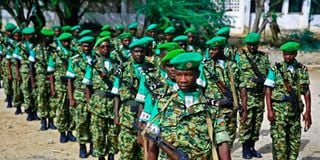Premium
UN Security Council to consider temporary extension of Amison stay

African Union (Amisom) soldiers from Burundi stand to attention in Mogadishu on July 11, 2017.
The African Union Mission in Somalia (Amisom) could get an additional three months of mandate to stay in the country, to give time for parties to negotiate its long term future, if the UN Security Council votes for it on Wednesday night.
The resolution to add three months to Amisom, whose mandate expires on December 31, is meant to avoid a vacuum as Somalia and the African Union haggle on its future composition.
It means that the 15-member UN organ will authorise the stay of Amisom until at least March next year to await a formal deal between Mogadishu and the African Union on whether the Mission should exit, restructure or be reorganised as a hybrid AU-UN force with civilian components.
Five permanent members
Traditionally, such a resolution could pass if none of the five permanent members: France, US, UK, Russia and China, veto it and as along as at least nine members endorse it. Yet this could only be kicking the can down the road. Amisom’s 14-year existence in Somalia has had its lows and highs.
Dr Hawa Noor Zitzmann, a Kenyan COFUND PhD Fellow in Global Governance and Regional Integration at the Bremen International Graduate School of Social Sciences told Nation.Africa the three months could provide for a way forward and clarity on the future of Amisom.
“It is important for the future of Amisom to be determined because it is expiring in about two weeks.
“Surely it would be a bit too exaggerated to claim that AMISOM has been very successful in its 14 years in Somalia.
Anarchy
“However, it has also managed to push back al-Shabaab which is also its main mandate and so withdrawing instantly as called for by the FGS [Federal government of Somalia) risks gains by al-Shabaab and a free fall back to the post 1991-like conditions of anarchy.”
The three-month extension, she argued, could allow parties to concentrate on ironing out their differences while ensuring the focus on security threats does not falter.
Amisom, composed of Kenyan, Ethiopian, Burundian, Ugandan and Djiboutian troops, has been in Somalia since 2007 when they helped establish the then transitional federal government.
Credited with pushing back al-Shabaab, they have helped liberate a number of towns in Somalia including the port city of Kismayu. However, critics charge that the lack of rebuilding Somalia institutions has made Somalia almost dependent on Amisom for its own functioning.
Earlier this year, the UN Security Council extended the Amisom mandate from February to December 2021 to allow for a discussion on its future, which could also include a review of the concept of operations (conops) by the African Union and Somalia. If things went well, a decision by the Council should have been made by October this year.
But the African Union and Somalia have differed on what form Amisom should take.
The African Union itself, and troop-contributing countries, support the AU-UN hybrid mission as the most suitable to grant sustainable funding and certainty. Despite being a UN-mandated mission, Amisom is not directly funded by the UN and relies on donors to run operations.
Transition Plan
Somalia however argues that the world must support the Transition Plan (STP) which means that Amisom should be given a specific period, say two years, in which they hand over the liberated areas to local security forces as they come out of the training mill. Somalia argues this can also be possible with the lifting of an arms embargo the country still carries.
The disagreement has seen Somalia protest directly to the UN, including the expulsion last month of Ugandan AU diplomat Simon Mulongo who was the deputy head of Amisom for carrying out “activities incompatible with AMISOM’s mandate and Somalia’s security strategy”.
“It is good that Somalis seem united on the STP but FGS should refrain from politicising the matter despite its legitimate call for its inclusion in decision making on matters concerning its territory,” Dr Zitzmann said of the political wrangles surrounding the debate.
“Delayed elections is a sign that it still has a full plate of internal problems that it needs to tackle. Healthy internal processes will ensure that institutions are built and those that are present strengthened such external support becomes unnecessary.”
African members of the Council; Kenya, Tunisia and Niger (as well as the Caribbean Island of St Vincent and Grenadines, all four known as A3+1) have argued for sustainable funding for Amisom or whatever its successor.
But the P5s including US, UK and France have argued for a more realistic changeover. Russia says the Amisom transition should consider Somalia’s view.





